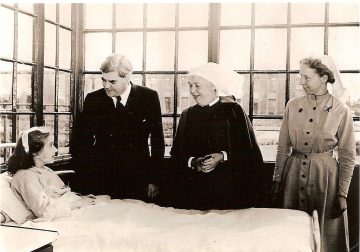So, I wish my flipping children had paid more attention to the slightly dodgy tennis coach in the local park to whom I entrusted their Grand Slam hopes for a £15 half hour lesson many years ago. Then I might have experienced the unbridled joy of Mr & Mrs Raducanu on Saturday night when the quite magnificent Emma won the hearts of the nation as she triumphed in the US Open. I know you should respect your children, and mine are now adults, but how difficult would it have been for them to learn how to hit a decent backhand down the line?
There is little I can add about this joyous and unexpected match which has brought a dazzling ray of optimism and ebullience to our otherwise lateral-flow test-dominated lives. For me, the moment of uncontrollable blubbing came during Emma’s spontaneous participation in a ‘Sweet Caroline’ chorus with the crowd. With the eyes of the world upon her and as The Queen, Dali Lama and Stephen Fry tapped out tweets of congratulations, the joyous singalong was impossible for her to resist. That’s why I would argue the cure for all the world’s problems can be found in this song.
You should all first thank me for my contribution to its cultural impact today. Back in 2009 at my daughter’s Bat Mitzvah, I asked the DJ to play the song and when he did, I suggested to my friends we stood on our chairs to join in. As I got up, people quickly followed and soon, like a pandemic in need of no vaccination, the room of partygoers did the same. Since that moment, I have been convinced that it was indeed me who invented the concept of the standing on wobbly chairs singalong which is now the centrepiece of any proper celebration and if followed by ‘Can’t Take My Eyes Off You’ and then ‘Can’t Smile Without You’ is basically known as ‘the cheese course’ by the partying cognoscenti.
The song has followed me at other key moments. In 2016, as I spluttered and lumbered to the finishing line at ‘The Great North Run’ the tannoy blasted it out along the home straight and I found a yard of pace as I crossed it before vomiting on the foot of a nearby runner. I knew then that my connection to the Neil Diamond classic, penned in 1969 was more than just co-incidence.
In an interview in 2007, Diamond said that the inspiration for the song was a picture he saw in a magazine of John F Kennedy’s daughter Caroline looking happy and pretty on a horse aged 11. The anecdote is however a little uncomfortable when you consider the line ‘Reaching out/Touching You/ Touching Me’ so he subsequently changed his tune in 2014 and said the song was actually about his then-wife Marcia but he needed it have a three-syllable name to fit the chorus. I know which story I prefer to believe.
The song has now become synonymous with sporting events across the globe and is a means of capturing the euphoria of victory. When England won the Cricket World Cup at Lords, even the fusty MCC members with their silly ties joined in the chorus with the hoi-polloi. Who can forget the joy at Wembley this year after England beat Germany in the Euros prompting Gareth Southgate to comment “so to be able to send them home feeling as they do tonight, to hear them at the end…I mean you can’t beat a bit of Sweet Caroline.”
My argument is thus a simple one.
If ‘Sweet Caroline’ communal karaoke makes us happy, why do we not do it more often in other parts of our lives? When did you last stop a family row at Sunday lunch by asking the important question “was it the spring, or was it the summer/who’d have believed you’d come along?” And when did you last drop your child off at school with a cheery reminder that “good times never seemed so good? ” (Even more effective if you sing to them as they flee for the safety of their classroom.)
It is at work that I believe the song can be most helpful. We are facing an autumn of location-based uncertainty. Some want to return full-time to office life, some favour a hybrid model and others genuinely fear the prospect of leaving the newly found convenience and security of homeworking. Inevitably, this is causing much corporate soul-searching as the executive quest for control is increasingly questioned by an individual’s desire for autonomy.
When CEO Tim Cook sent a company-wide memo in June telling staff they would be required back in work by early September, Apple employees weren’t happy and in an open-letter response called out “a disconnect between how the executive team thinks about remote/location flexible work and the lived experience of many Apple’s employees”. Flexibility is going to become the greatest loyalty-inducing value of a dynamic organisation with a poll reported in the BBC this year citing that 54% of people will consider quitting their companies if it is not present.
How can you avoid this possible antagonistic scenario? Very simple. Create a hybrid event every Monday morning where those in the office join those at home on zoom to belt out ‘Sweet Caroline” together, ideally at least a minimum of three times. If that doesn’t raise morale and corporate togetherness, I don’t know what else will?
There is a more prosaic alternative. The crowd-hysteria of a mass participation ‘Sweet Caroline’ stems from our innate need to feel part of something happy and to celebrate our success in the least complicated fashion. Organisations are going to have to learn to build cultures that do this whilst recognising that it is not always easy to be in the same place at the same time. How do you therefore build an esprit de corps that is predicated on separation? You focus on what you share and what you are achieving, but not where you are. The businesses that are struggling to re-impose a set of behaviours will have worse results than those that focus on achievement not location.
Which brings us back to Emma Raducanu, who won the US Open far away from her parents and friends, unburdened by expectation and fuelled by the unlimited optimism of youth. Her naturalness made that ‘Sweet Caroline’ rendition all the sweeter. So good. So good.
Adam’s first novel “The Curious Rise of Alex Lazarus” is available at amazon.co.uk



